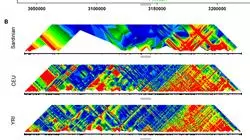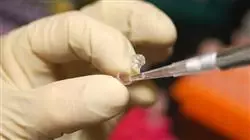University certificate
The world's largest faculty of medicine”
Introduction to the Program
Master, with this program, the most efficient mechanisms to manage statistical biases in Genomic and Precision Nutrition studies without compromising the results obtained"

Genomic and Precision Nutrition is a discipline that is in a continuous boom because the excellent advantages it brings to the area of Medicine have been detected, making possible the adoption of dietary plans oriented to the genetic particularities of each patient to combat diseases. These benefits have been found through numerous investigations, whose elaboration is essential to optimize the subsequent work of professionals in the more strictly practical health field. However, in order to carry out these studies properly, it is necessary to have the most up-to-date laboratory and biostatistical techniques available, in order to extract maximum performance and high efficiency in the research work.
For this reason, TECH has opted to design this program, through which the doctor will master the intricacies of this field related to Genomic and Precision Nutrition to perform their research tasks with a high level of solvency. Throughout this educational pathway, you will delve into the use of the most cutting-edge programs and tools for bioinformatics analysis or handle statistical errors in an appropriate way so as not to compromise the final result of the study. Likewise, you will master the use of the most common statistical software in this discipline.
Since this program has a 100% online modality, students will be able to achieve an effective learning process by managing their own time as they wish. In addition, you will have access to excellent teaching materials available in such innovative formats as explanatory video or interactive summary, which will allow you to enjoy an agreeable learning experience completely adapted to your educational requirements.
This Postgraduate diploma will enable you to use the most advanced and up-to-date programs and tools for bioinformatics analysis"
This Postgraduate diploma in Nutritional Genomics and Precision Nutrition. Laboratory, Biostatistics and Current Market contains the most complete and up-to-date scientific program on the market. The most important features include:
- The development of case studies presented by experts in Nutritional Genomics and Precision Nutrition
- The graphic, schematic, and practical contents with which they are created, provide scientific and practical information on the disciplines that are essential for professional practice
- Practical exercises where the self-assessment process can be carried out to improve learning
- Its special emphasis on innovative methodologies
- Theoretical lessons, questions to the expert, debate forums on controversial topics, and individual reflection work
- Content that is accessible from any fixed or portable device with an Internet connection
Acquire innovative competences for the design of clinical studies in humans by means of this Postgraduate diploma"
The program’s teaching staff includes professionals in the sector who contribute their work experience to this training program, as well as renowned specialists from leading societies and prestigious universities.
The multimedia content, developed with the latest educational technology, will provide the professional with situated and contextual learning, i.e., a simulated environment that will provide immersive education programmed to learn in real situations.
This program is designed around Problem-Based Learning, whereby the professional must try to solve the different professional practice situations that arise during the academic year For this purpose, the students will be assisted by an innovative interactive video system created by renowned and experienced experts.
Perfect your research work in the field of Genomic and Precision Nutrition through the knowledge you will acquire in this program"

Compatibilize your excellent learning with your personal and work obligations thanks to all the teaching facilities provided by this TECH program"
Syllabus
The syllabus of this degree is made up of 4 modules with which students will significantly expand their knowledge in the area of Genomic and Precision Nutrition, especially oriented to laboratory tasks. All the didactic materials to which you will have access throughout this educational period are available in convenient and varied formats such as complementary readings, explanatory video or interactive summary. This, in addition to its 100% online methodology, will favor a learning process adapted to the needs and particularities of study of each student.

Enjoy this syllabus, designed by the best professionals in Genomic and Precision Nutrition to guarantee the work applicability of everything you learn"
Module 1. Introduction to Nutritional Genomics and Precision Nutrition
1.1. Human Genome
1.1.1. DNA Discovery
1.1.2. Year 2001
1.1.3. Human Genome Project
1.2. Variations of Interest in Nutrition
1.2.1. Genomic Variations and the Search for Disease Genes
1.2.2. Environment vs. Genetic and Heritability
1.2.3. Differences between SNPs, Mutations and CNVs
1.3. The Genome of Rare and Complex Diseases
1.3.1. Examples of Rare Diseases
1.3.2. Examples of Complex Diseases
1.3.3. Genotype and Phenotype
1.4. Precision Medicine
1.4.1. Influence of Genetics and Environmental Factors in Complex Diseases
1.4.2. Need for Precision The problem of Missing Heritability Concept of Interaction
1.5. Precision Nutrition vs. Community Nutrition
1.5.1. The Principles of Nutritional Epidemiology
1.5.2. Current Bases of Nutritional Research
1.5.3. Experimental Designs in Precision Nutrition
1.6. Levels of Scientific Evidence
1.6.1. Epidemiological Pyramid
1.6.2. Regulation
1.6.3. Official Guides
1.7. Consortia and Major Studies in Human Nutrition and Genomic Nutrition
1.7.1. Precision4Health Project
1.7.2. Framingham
1.7.3. PREDIMED.
1.7.4. CORDIOPREV
1.8. Current European Studies
1.8.1. PREDIMED Plus
1.8.2. NU-AGE
1.8.3. FOOD4me
1.8.4. EPIC
Module 2. Laboratory Techniques for Nutritional Genomics
2.1. Molecular Biology Laboratory
2.1.1. Basic Instructions
2.1.2. Basic Material
2.1.3. Accreditations Required in the U.S.
2.2. DNA Extraction
2.2.1. From Saliva
2.2.2. From Blood
2.2.3. From Other Fabrics
2.3. Real-Time PCR
2.3.1. Introduction - History of the Method
2.3.2. Basic Protocols Used
2.3.3. Most Used Equipment
2.4. Sequencing
2.4.1. Introduction - History of the Method
2.4.2. Basic Protocols Used
2.4.3. Most Used Equipment
2.5. High-throughput
2.5.1. Introduction - History of the Method
2.5.2. Examples of Human Studies
2.6. Gene Expression - Genomics - Transcriptomics
2.6.1. Introduction. History of the Method
2.6.2. Microarrays
2.6.3. Microfluidic Cards
2.6.4. Examples of Human Studies
2.7. Omic Technologies and their Biomarkers
2.7.1. Epigenomics
2.7.2. Proteomics
2.7.3. Metabolomics
2.7.4. Metagenomics
2.8. Bioinformatics Analysis
2.8.1. Pre- and Post-Computing Bioinformatics Programs and Tools
2.8.2. GO Terms, Clustering of DNA Microarray Data
2.8.3. Functional Enrichment, GEPAS, Babelomics
Module 3. Biostatistics for Genomic Nutrition
3.1. Biostatistics
3.1.1. Human Studies Methodology
3.1.2. Introduction to Experimental Design
3.1.3. Estudios clínicos
3.2. Statistical Aspects of a Protocol
3.2.1. Introduction, Objectives, Description of Variables
3.2.2. Quantitative Variables
3.2.3. Qualitative Variables
3.3. Design of Clinical Studies in Humans, Methodological Guidelines
3.3.1. Designs with 2 treatments 2x2
3.3.2. Designs with 3 treatments 3x3
3.3.3. Parallel, Cross-Over, Adaptive Design
3.3.3. Sample Size Determination and Power Analysis
3.4. Evaluation of Treatment Effect
3.4.1. For Parallel Design, for Repeated Measurements, for Cross-Over Design
3.4.2. Randomization of the Order of Treatment Assignment
3.4.3. Carry-Over Effect (Wash Out)
3.5. Descriptive Statistics, Hypothesis Testing, Risk Calculation
3.5.1. Consort, Populations
3.5.2. Study Populations
3.5.3. Control Group
3.5.4. Subgroup Analysis Types of Studies
3.6. Statistical Errors
3.6.1. Measurement Errors
3.6.2. Random Error
3.6.3. Systematic Error
3.7. Statistical Bias
3.7.1. Selection Bias
3.7.2. Observation Bias
3.7.3. Sesgo de asignación
3.8. Statistical Modeling
3.8.1. Continuous Variable Models
3.8.2. Categorical Variables Models
3.8.3. Linear Mixed Models
3.8.4. Missing data, Flow of Participants, Presentation of Results
3.8.5. Adjustment for Baseline Values, Transformation of Response Variable: Differences, Ratios, Logarithms, Carry-Over Evaluation
3.9. Statistical Modeling with Covariate
3.9.1. ANCOVA
3.9.2. Logistic Regression for Binary and Count Variables
3.9.3. Multivariate Analysis
3.10. Statistical Programs
3.10.1. The R
3.10.2. SPSS
Module 4. Current Market State
4.1. Legal Aspects
4.2. DTC (Direct-to-Consumer) Tests
4.2.1. Pros and Cons
4.2.2. Myths of Early DTCs
4.3. Quality Criteria for a Nutrigenetic Test
4.3.1. SNP Selection
4.3.2. Interpretation of Results
4.3.3. Laboratory Accreditations
4.4. Health Professionals
4.4.1. Training Needs
4.4.2. Criteria of Professionals Applying Genomic Nutrition
4.5. Nutrigenomics in the Media
4.6. Integration of Evidence for Personalized Nutritional Counseling
4.7. Critical Analysis of the Current Situation
4.8. Discussion Work
4.9. Conclusions, use of Nutritional Genomics and Precision Nutrition as Prevention

By enrolling in this Postgraduate diploma, you will gain the most up-to-date knowledge on the market in Nutritional Genomics and Precision Nutrition. Laboratory, Biostatistics and Current Market"
Postgraduate Diploma in Nutritional Genomics and Precision Nutrition. Laboratory, Biostatistics and Current Market
Genomic and precision nutrition is currently revolutionising the way we understand the relationship between food and health. This emerging discipline uses each individual's genetic information to personalise and optimise their nutritional plan, providing more effective and lasting results. At TECH Global University, we have developed a program of online classes focused on providing you with the knowledge and skills necessary to excel in this cutting-edge field. Our Postgraduate Diploma in Nutrigenomics and Precision Nutrition. Laboratory, Biostatistics and Current Market for Nursing combines the flexibility of online classes with the academic quality that distinguishes us as a leading educational institution. Through our online platform, you will have access to up-to-date and engaging content, taught by professionals specialised in the field of nutrition and genetics.
Discover the power of genomic and precision nutrition from the comfort of your home
In this program, you will learn how to interpret genetic profiles and use that information to design personalised nutritional plans. You will explore advances in genomic technology and biostatistics, and understand how to apply this knowledge in clinical practice. In addition, you will acquire practical laboratory skills to analyse biological samples and obtain data relevant to genomic nutrition. Online classes offer numerous benefits to your learning process. You will be able to access the materials at any time and from anywhere, adapting them to your pace and schedule. In addition, you will have the support of specialised tutors who will guide you through the program, giving you personalised feedback and answering your questions. Upon completion of the program, you will receive a certificate from TECH Global University, backed by our reputation as an institution committed to academic excellence. This recognition will open doors for you in today's job market, where the demand for professionals trained in genomic and precision nutrition is constantly growing. Don't miss this opportunity to excel in the field of nutrition - enroll today in our online Postgraduate Diploma in Nutrigenomics and Precision Nutrition - Laboratory, Biostatistics and Current Market for Nursing and start transforming lives through personalised nutrition!







